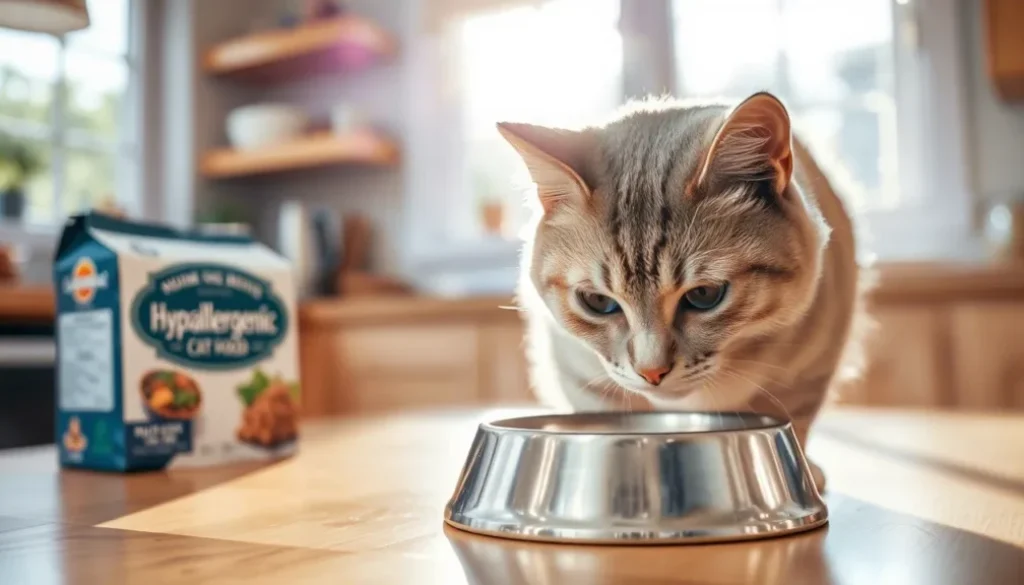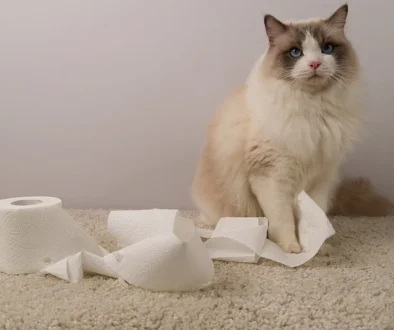Best Cat Food for Cats with Allergies: A Complete 2025 Guide
If your beloved cat constantly scratches, licks, or suffers from digestive issues, food allergies might be the culprit. Finding the right cat food for cats with allergies is essential for managing symptoms and promoting a healthy, happy life.
In this comprehensive guide, we’ll explore the causes of feline food allergies, how to identify them, and the best hypoallergenic cat food options available. Whether your cat suffers from skin irritation or sensitive digestion, we’ll help you make informed choices with confidence.
What Causes Food Allergies in Cats?
Food allergies occur when your cat’s immune system mistakenly identifies a food ingredient as harmful. The most common allergens include:
- Beef
- Dairy
- Chicken
- Fish
- Corn
- Wheat
- Soy
- Eggs
Unlike food intolerances (which are more about digestion), food allergies often lead to immune responses such as itching, swelling, and skin lesions.
Signs Your Cat May Have a Food Allergy
Cats can’t tell you what’s wrong, so it’s important to watch for signs of food allergies. Common symptoms include:
- Persistent scratching or licking
- Hair loss or bald spots
- Vomiting or diarrhea
- Ear infections
- Red or inflamed skin
- Frequent bowel movements
If you notice these signs, consult your vet for diagnosis and an elimination diet plan.
Choosing the Best Cat Food for Cats with Allergies
When selecting cat food for cats with allergies, it’s crucial to opt for formulas that are free from common allergens. Here are three main types of allergy-friendly cat food:
1. Limited Ingredient Diets (LID)
These formulas use a minimal number of ingredients to reduce the risk of triggering allergies. Often include:
- A single novel protein (e.g., rabbit, duck, venison)
- A single carbohydrate source (e.g., sweet potato, peas)
2. Hydrolyzed Protein Diets
Proteins are broken down into smaller components so the immune system doesn’t recognize them as allergens. Often recommended for severe allergy cases.
3. Novel Protein Diets
These use proteins your cat hasn’t been exposed to before (e.g., kangaroo, alligator, or quail), reducing the chance of an allergic reaction.
You may like: Hypo Allergenic Cat Food: A Complete Guide for Sensitive Cats
Top 5 Best Cat Foods for Cats with Allergies (2025 Edition)
Here’s a comparison table to help you choose the best cat food for cats with allergies:
| Brand | Type | Key Ingredients | Features | Price Range |
|---|---|---|---|---|
| Hill’s Prescription Diet d/d | LID | Duck & Green Pea | Vet-recommended, skin support | $$$ |
| Blue Buffalo Basics | LID | Turkey & Potato | Grain-free, single protein | $$ |
| Royal Canin Hypoallergenic | Hydrolyzed Protein | Hydrolyzed Soy Protein | Veterinary diet, ideal for trials | $$$$ |
| Natural Balance LID | LID | Duck & Pea | No grains or artificial flavors | $$ |
| Instinct Limited Ingredient | LID & Novel Protein | Rabbit & Peas | Raw-coated kibble, high protein | $$$ |
How to Transition to Allergy-Friendly Cat Food
Changing your cat’s food abruptly can cause more harm than good. Follow these steps to ensure a smooth transition:
- Start Slowly: Mix 25% of the new food with 75% of the old food.
- Gradually Increase: Over 7–10 days, increase the proportion of new food.
- Observe Symptoms: Monitor for any changes positive or negative in your cat’s behavior and health.
- Avoid Treats and Table Scraps: Stick to the new diet strictly to assess effectiveness.
Homemade Cat Food for Cats with Allergies (Vet-Approved)
If you prefer a homemade approach, work with a veterinary nutritionist to develop a balanced recipe. Here’s a basic vet-approved hypoallergenic cat food recipe:
Homemade Hypoallergenic Cat Food Recipe
Ingredients:
- 1 lb ground rabbit (or other novel protein)
- 1 cup cooked pumpkin
- 1 tsp fish oil (for Omega-3)
- 1/4 tsp taurine supplement (essential amino acid)
- Optional: crushed eggshells for calcium
Instructions:
- Cook the rabbit thoroughly.
- Mix in pumpkin and fish oil.
- Let cool and add taurine.
- Store in an airtight container in the fridge for up to 3 days.
Note: Always consult your vet before feeding homemade meals to ensure complete nutrition.
Supplements That Help Manage Cat Allergies
While food is the primary way to manage allergies, some supplements can help:
- Omega-3 Fatty Acids: Reduce inflammation and support skin health.
- Probiotics: Support gut health, which is linked to immune response.
- Quercetin: A natural antihistamine that helps minimize allergic reactions (vet approval required).
- Digestive Enzymes: Aid in breaking down potential allergens during digestion.
Avoid These Common Mistakes
Choosing cat food for cats with allergies isn’t always straightforward. Here are some pitfalls to avoid:
- ❌ Self-diagnosing without vet consultation
- ❌ Switching food too quickly
- ❌ Feeding treats with hidden allergens
- ❌ Not reading ingredient labels carefully
- ❌ Skipping allergy testing when needed
Tips for Managing Allergies Long-Term
- ✅ Schedule regular vet visits for health checks.
- ✅ Use stainless steel or ceramic bowls to avoid irritants.
- ✅ Vacuum and clean frequently to reduce environmental allergens.
- ✅ Maintain a consistent diet once the right food is found.
- ✅ Record symptoms and food reactions in a journal.
Frequently Asked Questions (FAQs)
1. What is the best cat food for cats with allergies?
There is no one-size-fits-all answer. The best food depends on your cat’s specific allergens. Limited ingredient or hydrolyzed protein diets are often effective.
2. How can I tell if my cat has a food allergy?
Common signs include itching, vomiting, diarrhea, and skin inflammation. A vet will likely recommend an elimination diet to diagnose the allergy.
3. Are grain-free diets better for allergic cats?
Not necessarily. While some cats are sensitive to grains, others may react to proteins. It’s important to identify the specific allergen rather than make assumptions.
4. Can I feed raw food to an allergic cat?
Yes, but only under vet supervision. Raw diets must be carefully balanced to meet nutritional needs and reduce contamination risks.
5. How long does it take to see improvement after switching food?
Most cats show improvement within 4–6 weeks, though some may take up to 12 weeks depending on the severity of the allergy.
6. Is homemade cat food safe for allergies?
Yes, if prepared with guidance from a veterinary nutritionist. Homemade food allows for full control over ingredients but must be nutritionally balanced.
Final Thoughts
Managing allergies in cats can be challenging, but with the right approach and food, your feline companion can enjoy a vibrant, itch-free life. Choosing the best cat food for cats with allergies starts with knowledge, patience, and veterinary support.
When in doubt, always consult your vet before making changes to your cat’s diet. Your efforts can significantly improve your cat’s quality of life—one bowl at a time.
You May Like:
1. Top 10 Most Popular Cat Breeds in Australia
2. 9 Ways to Reduce Cat Allergens in Your Home





What Is the Best Dog Food for Small Breed Dogs? - EmzillaTech - Best Pet Food Reviews & Expert Advice
May 21, 2025 @ 4:24 am
[…] You May Like: Best Cat Food for Cats with Allergies: A Complete 2025 Guide […]
What to Feed a Fussy Cat? - EmzillaTech - Best Pet Food Reviews & Expert Advice
May 21, 2025 @ 4:58 am
[…] If your cat is allergic read this: Best Cat Food for Cats with Allergies […]